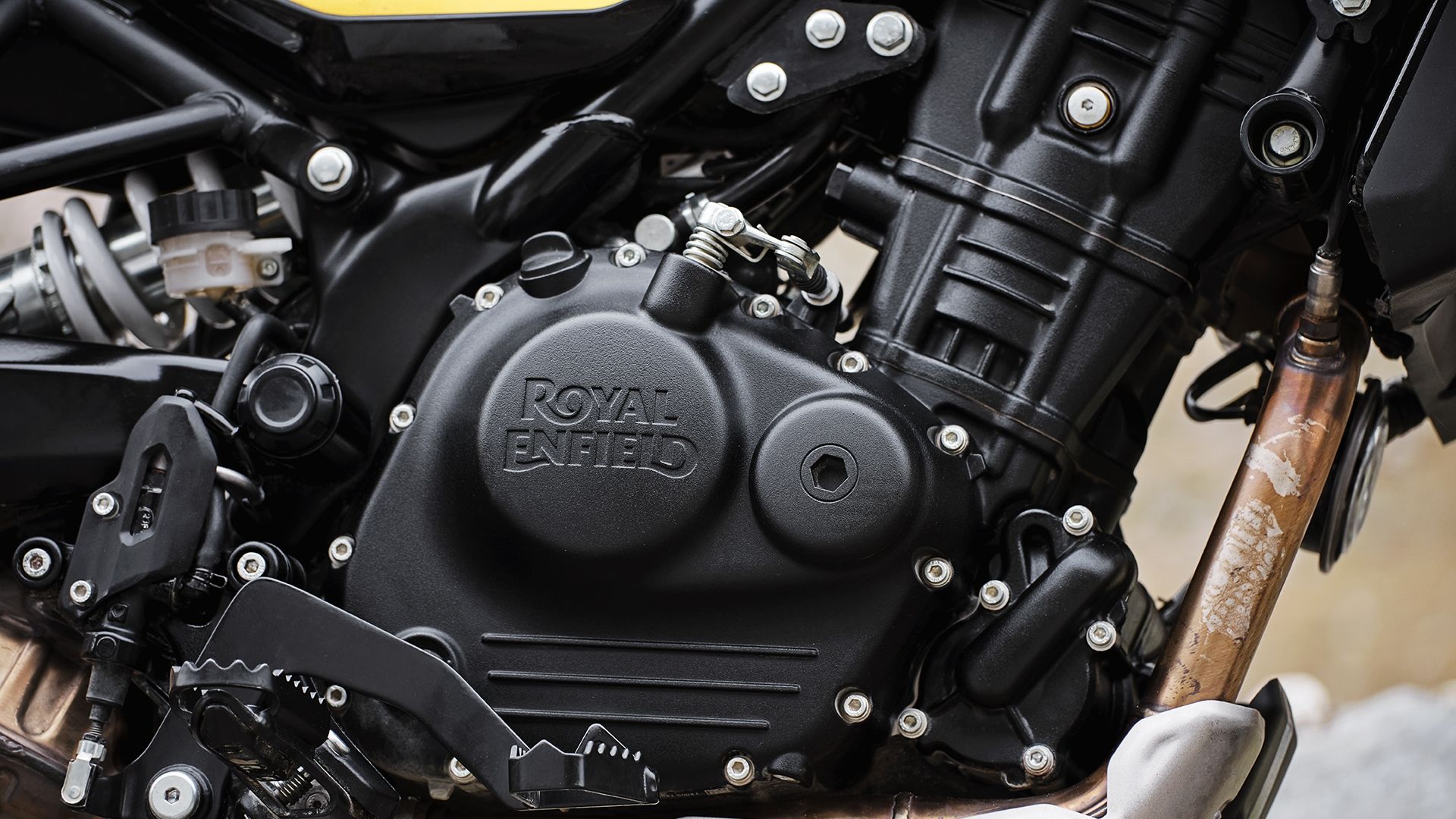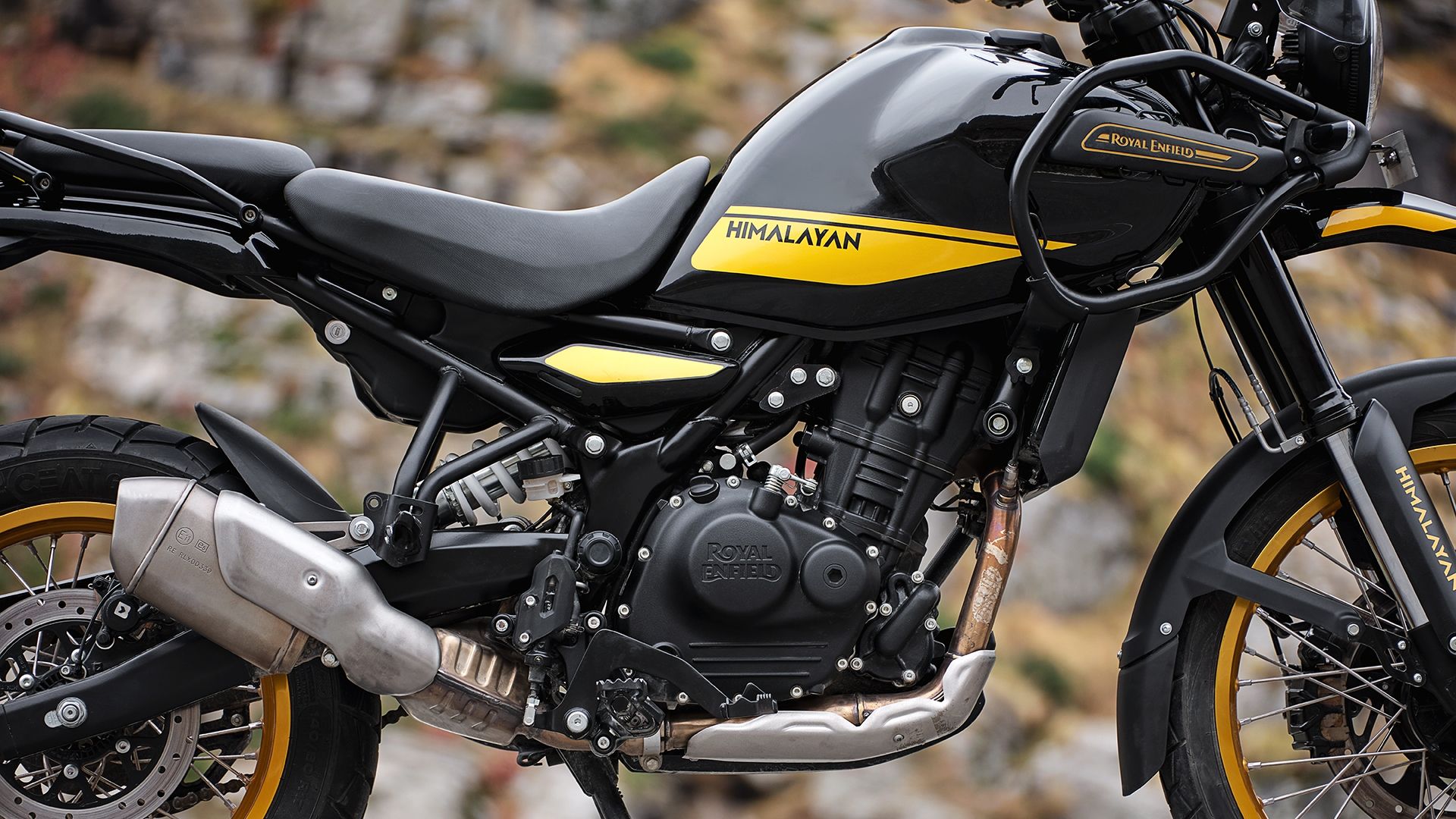Royal Enfield Sherpa 450 Engine: Top 5 Features Explained

Highlights
- All-new Sherpa 450, liquid-cooled, 4V, DOHC engine
- 39.5 bhp @ 8,000 rpm, 40 Nm @ 5,500 rpm
- Maximum engine speed of 8,750 rpm
At the heart of the all-new Royal Enfield Himalayan is a new, bigger, more powerful 452 cc engine, apart from new chassis components, new features and new design. There are other changes in the new Himalayan, which include ride-by-wire with two riding modes (first for a Royal Enfield), more ground clearance (230 mm), bigger disc brakes (320 mm front, 270 mm rear), full LED lighting (with integrated taillight and indicators) and a distinctive circular TFT screen.
The new console is Bluetooth-enabled and the ability to showcase Google Maps alongside other crucial information like speed, range, rev counter and gear position. But what really stands out is the more flexible new Sherpa 450 engine. So, what's unique about the new Himalayan engine, and what makes it stand out from the old Himalayan's LS 410 engine? Here’s a look at what’s new, and what’s changed on the new Royal Enfield 452 cc engine.
Also Read: New Royal Enfield Himalayan Specifications Revealed
1)More Displacement, More Performance

New 452 cc, single-cylinder, 4-valve, DOHC engine is Royal Enfield's first liquid-cooled motor.
The Royal Enfield Sherpa 450 engine is bigger than the outgoing LS 410 engine, with engine displacement increasing to 452 cc from 411 cc. The Sherpa 450 is also RE’s first liquid-cooled engine, replacing the air-cooled 411 cc engine of the outgoing Himalayan. In numbers, the Sherpa 450 makes 39.5 bhp at 8,000 rpm and 40 Nm of peak torque at 5,500 rpm. Comparatively, the LS 410 makes 28 bhp at 6,500 rpm and 32 Nm at 4,000-4,500 rpm. Also used is a slip and assist clutch with a new 6-speed transmission. Performance mode is meant to deliver full power, while Eco mode is designed to soften the throttle response and lower power in the first four gears.
Also Read: Top 5 Highlights Of All-New Royal Enfield Himalayan
2)New Architecture

The Sherpa 450 engine has a bigger bore (84 mm) and shorter stroke (81.5 mm) than the LS 410 engine.
The basic architecture of the Sherpa 450 has also been changed. Compared to the long-stroke (LS) 410 engine, the Sherpa 450 is almost square, with 84 mm bore and 81.5 mm stroke (with a bigger bore and shorter stroke than the LS 410 engine). The top-end has also been completely changed with the Sherpa 450 implementing a four-valve head with double overhead camshaft (DOHC), compared to the 2-valve, SOHC set-up of the LS 410. There’s also a hydro-mechanical cam chain tensioner designed to decrease engine clatter and offer smoother operation.
3)Updated Internals

The internals of the engine have been thoroughly updated with changes made to reduce friction and improve refinement.
The new engine uses an aluminium barrel which allows reduced piston clearance. The forged piston and plated bore allow for high piston speed and high cylinder pressures. A semi-dry sump has been incorporated to reduce frictional and pumping losses in the crank, and DLC (diamond-like carbon) coating has been incorporated as well in critical parts of the valvetrain. All of these changes have helped reduce overall weight (by 10 kg) and improve thermal efficiency, and also offers a higher compression ratio (11.5: 1) resulting in better performance and more power.
4)Efficiently Managed Mass, High Power Alternator

Although suspension travel remains the same up front, the semi-dry sump, repositioned airbox and cat box have freed up 3 mm more ground clearance.
Apart from being lighter, the Sherpa 450 engine also has been designed with an angled cylinder. The design offers the engine to be a stressed member of the chassis allowing minimised chassis mass, but also offers repositioned catalytic converter, silencer and airbox positioning. All these changes have resulted in the overall mass positioned as low and forward as possible. The high power (418V) alternator should support multiple electrical accessories, including aux lights.
5)Wider Rev Range, Higher Redline

The Sherpa 450 has a wider rev range, with a more flexible and wider powerband.
With all the changes in the new Royal Enfield Sherpa 450 engine, there should be a considerable advantage in performance. Idle speed of the Sherpa 450 is 1,300 rpm and maximum engine speed is 8,750 rpm, with the torque curve showing a wide usable band spanning 3,000 rpm and 8,000 rpm. In all, there’s a 65 per cent increase in peak power, 25 per cent increase in peak torque and 25 per cent increase in maximum engine speed over the LS 410 engine.

The Sherpa 450 engine displays a much wider and steeper torque curve, compared to the LS 410 engine.
Royal Enfield Sherpa 650 Engine Specifications:
| Type | Liquid-Cooled, Single-Cylinder, 4-Valve, DOHC |
| Displacement | 452 cc |
| Bore x Stroke | 84 mm x 81.5 mm |
| Compression Ratio | 11.5:1 |
| Maximum Power | 39.5 bhp @ 8,000 rpm |
| Peak Torque | 40 Nm @ 5,500 rpm |
| Idle Rpm | 1,300 rpm |
| Maximum Engine Speed | 8,750 rpm |
| Starting System | Electric Start |
| Lubrication | Semi-Dry Sump |
| Gearbox | 6-Speed |
| Clutch | Wet, Multi-Plate, Slip & Assist |
| Engine Oil Grade | 10W40 API SN, JASO MA2, SEMI SYNTHETIC |
| Fuel Injection | Electronic Fuel Injection, 42 mm Throttle Body, Ride-By-Wire System |
Latest News
Research More on Royal Enfield Himalayan
Popular Royal Enfield Models
 Royal Enfield Hunter 350Ex-Showroom Price₹ 1.5 - 1.69 Lakh
Royal Enfield Hunter 350Ex-Showroom Price₹ 1.5 - 1.69 Lakh Royal Enfield Classic 350Ex-Showroom Price₹ 2 - 2.3 Lakh
Royal Enfield Classic 350Ex-Showroom Price₹ 2 - 2.3 Lakh Royal Enfield Interceptor 650Ex-Showroom Price₹ 3.03 - 3.31 Lakh
Royal Enfield Interceptor 650Ex-Showroom Price₹ 3.03 - 3.31 Lakh Royal Enfield Bullet 350Ex-Showroom Price₹ 1.74 - 2.16 Lakh
Royal Enfield Bullet 350Ex-Showroom Price₹ 1.74 - 2.16 Lakh Royal Enfield Super Meteor 650Ex-Showroom Price₹ 3.49 - 3.79 Lakh
Royal Enfield Super Meteor 650Ex-Showroom Price₹ 3.49 - 3.79 Lakh Royal Enfield Continental GT 650Ex-Showroom Price₹ 3.19 - 3.45 Lakh
Royal Enfield Continental GT 650Ex-Showroom Price₹ 3.19 - 3.45 Lakh Royal Enfield Meteor 350Ex-Showroom Price₹ 2.1 - 2.3 Lakh
Royal Enfield Meteor 350Ex-Showroom Price₹ 2.1 - 2.3 Lakh Royal Enfield Scram 411Ex-Showroom Price₹ 2.03 - 2.08 Lakh
Royal Enfield Scram 411Ex-Showroom Price₹ 2.03 - 2.08 Lakh Royal Enfield Bear 650Ex-Showroom Price₹ 3.39 - 3.59 Lakh
Royal Enfield Bear 650Ex-Showroom Price₹ 3.39 - 3.59 Lakh Royal Enfield Classic 650Ex-Showroom Price₹ 3.37 - 3.5 Lakh
Royal Enfield Classic 650Ex-Showroom Price₹ 3.37 - 3.5 Lakh Royal Enfield Goan Classic 350Ex-Showroom Price₹ 2.35 - 2.38 Lakh
Royal Enfield Goan Classic 350Ex-Showroom Price₹ 2.35 - 2.38 Lakh Royal Enfield Guerrilla 450Ex-Showroom Price₹ 2.39 - 2.54 Lakh
Royal Enfield Guerrilla 450Ex-Showroom Price₹ 2.39 - 2.54 Lakh Royal Enfield Himalayan 450Ex-Showroom Price₹ 2.69 - 3.09 Lakh
Royal Enfield Himalayan 450Ex-Showroom Price₹ 2.69 - 3.09 Lakh Royal Enfield Scram 440Ex-Showroom Price₹ 2.08 - 2.15 Lakh
Royal Enfield Scram 440Ex-Showroom Price₹ 2.08 - 2.15 Lakh Royal Enfield Shotgun 650Ex-Showroom Price₹ 3.59 - 4.25 Lakh
Royal Enfield Shotgun 650Ex-Showroom Price₹ 3.59 - 4.25 Lakh











